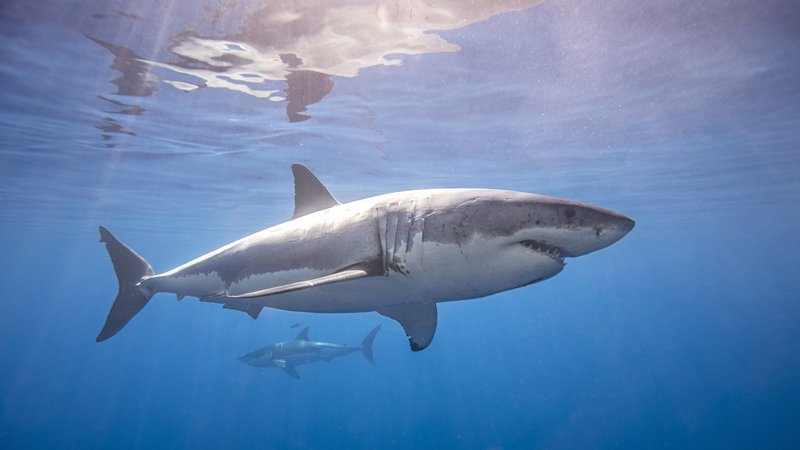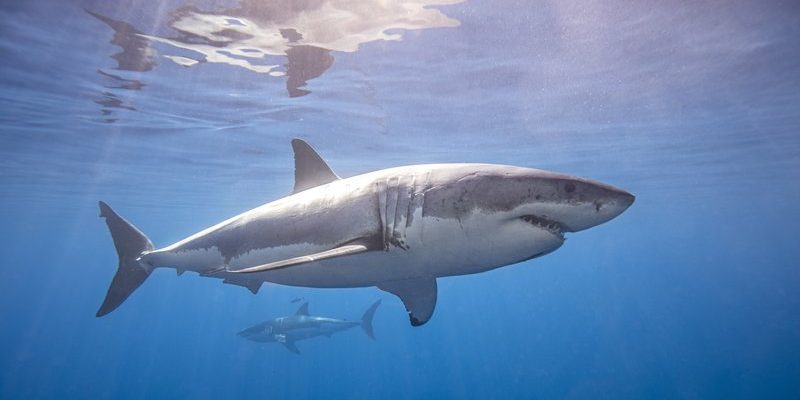
Imagine surfing on a sunny day, the waves crashing around you, and suddenly you catch sight of a sleek dorsal fin breaking the surface. Your heart races, but instead of fear, curiosity bubbles to the forefront. Sharks are not just apex predators; they play a crucial role in maintaining the health of our oceans. If you’re wondering why these creatures matter so much, keep reading! Here are ten captivating facts about sharks that might just change your perspective.
1. Sharks Have Been Around for Over 400 Million Years
Here’s the thing: sharks are ancient. They first appeared on Earth long before dinosaurs roamed the planet. In fact, sharks have been around for more than 400 million years! That means they have survived five mass extinctions! Their incredible adaptability is one reason why they’ve managed to thrive through so many changes.
Sharks have evolved over time, developing various shapes and sizes to suit their environments. For instance, the Megalodon, which lived around 23 million years ago, was a massive shark that could reach lengths of up to 60 feet. Comparatively, modern-day great white sharks usually top out at about 20 feet. These ancient fish have evolved to become highly efficient hunters, with specialized adaptations that make them uniquely suited to their oceanic habitats.
It’s fascinating to think about how these creatures have witnessed all sorts of changes in the world while remaining largely unchanged themselves. This endurance highlights just how remarkable they truly are!
2. They Come in All Shapes and Sizes
When you think of sharks, you might picture a great white or a hammerhead, but sharks actually come in all sorts of shapes and sizes. Weighing as little as 5.5 pounds and reaching lengths of only 1.5 feet, the dwarf lanternshark is one of the tiniest sharks out there! On the other end of the spectrum, the whale shark can grow to an astonishing 40 feet or more, making it the largest fish in the ocean.
One interesting aspect of shark diversity is how their shapes help them survive. For example, the nurse shark has a more flattened body, which allows it to rest on the ocean floor and blend in with the environment while it hunts for prey. In contrast, the agile tiger shark has a streamlined body, helping it to be an efficient predator in open waters.
This variety is a testament to the adaptability of sharks, showcasing just how versatile and resilient these creatures can be in different ecosystems.
3. They Have an Amazing Sense of Smell
Sharks possess an extraordinary sense of smell, enabling them to detect blood and other scents in the water from miles away. It’s estimated that some sharks can sense just one drop of blood in an Olympic-sized swimming pool! Imagine having that superpower!
What’s fascinating is how this keen sense of smell works. Sharks have olfactory bulbs that are highly developed, making them incredibly sensitive to even the faintest traces of blood or other chemical signals in the water. This ability allows them to locate injured prey or find mates with ease.
However, it’s important to note that sharks don’t rely solely on their sense of smell. They also use their acute vision and unique electroreception abilities to detect the electrical fields generated by other creatures. This combination helps them track down food effectively, showcasing their role as apex predators in the ocean.
4. Sharks Can Regenerate Teeth
One of the coolest facts about sharks is their ability to regenerate teeth. Sharks lose teeth regularly—up to 30,000 teeth in their lifetime! But don’t worry; they have a backup plan. When a tooth is lost, another one moves forward to replace it, almost like a conveyor belt of teeth!
This regenerative ability is crucial for their survival. Sharks have rows of teeth, and losing them doesn’t hinder their ability to hunt. In fact, some species, like the great white, can have up to three rows of teeth ready to go at any time, which helps them maintain their predatory edge.
Unfortunately, this is also a reason why sharks are often wrongly labeled as ruthless killers. Their teeth are designed for efficiency, not cruelty. They need these teeth to catch and consume prey, and their regeneration showcases their incredible evolution over millions of years.
5. Sharks Play a Key Role in Marine Ecosystems
Sharks aren’t just fierce hunters; they play a vital role in maintaining the balance of marine ecosystems. As apex predators, they help regulate the populations of other fish and marine animals. This balance prevents overgrazing of key species, which can lead to unhealthy habitats.
For example, when shark populations decline, it can cause a ripple effect through the entire ecosystem. Without sharks to keep them in check, species like sea turtles and certain fish can overpopulate, leading to significant changes in the environment. This can disrupt coral reefs and other vital habitats, showcasing just how interconnected life in the ocean really is.
So, when you see headlines about shark conservation, remember that protecting sharks means protecting the health of our oceans. Every creature, big and small, has a part to play in the delicate dance of life in the sea.
6. They Communicate in Unique Ways
Sharks have communication skills that might surprise you. While they don’t speak in words, they use body language and certain behaviors to convey messages to each other. For instance, sharks will often use posture and swimming patterns to establish dominance or attract mates.
Some species, like the whitetip reef shark, have been observed playing and engaging in social behaviors, suggesting that they can form social bonds. It’s amazing to think that these creatures, often portrayed as solitary hunters, might be more social than we realize.
In addition, certain shark species will engage in breaching—jumping out of the water—perhaps to communicate, shake off parasites, or simply for play. This behavior is indicative of a shark’s health and vigor, further demonstrating that there’s so much more to these animals than their reputation suggests.
7. They Have a Unique Reproductive Process
Shark reproduction might seem simple, but it’s actually quite complex. Sharks are known for having a variety of reproductive strategies, including oviparity (laying eggs), ovoviviparity (eggs hatch inside the mother), and viviparity (live birth). Different species have adapted their reproductive methods to suit their environments.
For instance, the great white shark is viviparous, giving birth to live young after a gestation period of about 11 months. On the other hand, the hammerhead shark lays eggs, which develop outside the mother’s body. This diversity in reproductive strategies helps ensure that species can survive in various marine conditions.
Interestingly, female sharks can store sperm for several months, allowing them to fertilize their eggs when conditions are just right. This capability means that they can time the birth of their pups for when food is plentiful and survival odds are higher. These adaptations showcase the incredible resilience and intelligence of sharks in their quest to thrive.
8. They Have Unique Liver Oils for Buoyancy
Sharks are fascinating when it comes to their buoyancy. Unlike most fish that use swim bladders to stay afloat, sharks rely on their large, oil-filled livers. The oils in their livers are less dense than water, allowing them to maintain buoyancy without expending much energy.
This adaptation is particularly crucial for sharks, as they often inhabit deep waters, where the pressure is immense. The liver can account for up to 30% of a shark’s body weight, providing not only buoyancy but also a reserve of energy.
In a way, their livers act like a built-in life raft, allowing them to save energy and stay afloat while they cruise the depths of the ocean. Isn’t it remarkable how evolution has equipped these magnificent creatures to thrive in their environments?
9. Sharks Are Essential for Conservation
As we’ve seen, sharks play an essential role in maintaining healthy marine ecosystems. Unfortunately, many shark populations are declining due to overfishing and habitat destruction. This decline is concerning, not just for sharks but for the entire oceanic environment.
Shark conservation efforts are crucial to help maintain balance in marine ecosystems. Organizations around the world are working to protect sharks through various means, such as establishing marine protected areas and advocating for sustainable fishing practices.
By supporting shark conservation, we’re not only ensuring the survival of these incredible creatures but also the health of our oceans. It’s a win-win situation that benefits all marine life.
10. There Are Over 500 Species of Sharks
Finally, did you know there are over 500 species of sharks swimming in our oceans? From the tiny dwarf lanternshark to the mighty whale shark, each species has unique characteristics and adaptations that make them fascinating in their own right.
This incredible diversity means there’s always something new to learn about sharks. Some species inhabit shallow coastal waters, while others prefer the deep sea. With ongoing research, we are continually discovering new species and learning more about their behaviors and habitats.
Sharks are not just one-dimensional predators. They are a diverse group of animals that have adapted in extraordinary ways to survive in various environments. Each species plays its part in the grand tapestry of ocean life.
In conclusion, sharks are much more than just fearsome predators; they are vital to the ecosystems they inhabit. Understanding these creatures helps us appreciate their importance and the need to protect them. So next time you hear about sharks, remember the amazing facts behind them—they truly are one of nature’s wonders!

